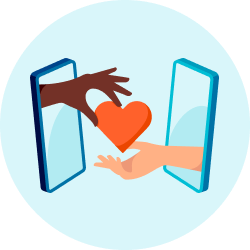Learn
Guides
-
Whole Health Tracker - Part 2 (additional weeks)
This is the second part of the Whole Health Tracker PDF. This document only offers the pages for weeks 2-8 for journaling.
-
Recovering Your Mental Health
This SAMHSA guide provides information on recovering from mental health issues.
-
Whole Health Tracker - Part 1 (intro + first week)
This PDF version of the Whole Health Tracker allows users to print this guide and use it to support mental and behavioral health. Note that this version only provides the introductory information and the first week.
-
The Family and Friends' Guide to Recovery From Depression and Bipolar Disorder
This guide, provided by the Depression and Bipolar Alliance, provides ways you can help friends or family members throughout their recovery while empowering them to make their own choices.
Articles
-
Is Therapy or Medication Better For Depression?
The ideal depression treatment differs from person-to-person, but research suggests a combination of medication and therapy may be best.
-
Finding the right care
Where to turn when you need help with depression
-
About Behavioral Health Care
Behavioral health care focuses on an individual's psychological wellness. It is occasionally referred to as mental health care.
-
The Importance of Mental Health
Mental health includes our emotional, psychological, and social wellbeing.
Find self-help resources
Courses
-
QPR Suicide Prevention Training
This education program uses the "Question, Persuade, Refer" (QPR) model to reduce suicide risk. This may help you save a life by learning suicide warning signs, how to talk with someone at risk and where to seek help. It's important to take precautions and not ignore talk of suicide or hopelessness. Learn more about suicide prevention and coping as a suicide survivor.
Resources
-
Support Programs - National Alliance on Mental Illness (NAMI)
A list of resource links and NAMI programs for consumers and their families.
-
Warmlines for Mental Health Support
A warmline is a peer-run listening line staffed by people in recovery themselves. Because there is no single comprehensive source for all warmlines in the country, the best way to find a local warmline is to use your browser and search for “warmline” and the name of your state.
-
National Institute of Mental Health (NIMH)
Working to improve mental health through biomedical research on mind, brain, and behavior.
-
Depression
This link provides resources and information on depression. MedlinePlus is a service of the U.S. National Library of Medicine and the National Institute of Health.
Videos
-
Understanding Emotional Numbness
This video explains emotional numbness, its causes and symptoms, and relief options.
-
How to Navigate Depression: Things to Try
This video provides some tips for how to fight depression.
Important notices:
![]() Indicates that you are leaving our site and these links to other sites are for informational purposes only.
Indicates that you are leaving our site and these links to other sites are for informational purposes only.
Many of these programs require registration to ensure your privacy. Those requiring registration are denoted by words "(login required)" in the title. Your use of these programs is not monitored, reported individually nor does it become part of your medical record. Also, be sure your popup blocker allows access. View our FAQs for information about how to turn popup blockers off.
This site provides health content designed to complement and enhance your personal health management. It does not provide medical advice or other health services. It is not meant to replace professional advice or imply coverage of specific clinical services or products. The information featured in this site is general in nature and is not a substitute for professional health care. If you have specific health care needs, consult an appropriate health care professional.
This site does not operate, control or endorse any information, products or services provided by third parties through the Internet. Use of other sites is strictly at your own risk including any risks associated with destructive viruses. We assume no responsibility for any circumstances arising out of the use, misuse, interpretation or application of any information or other material provided on this site or linked web sites.
The inclusion of links to other web sites does not imply any endorsement of the material on the web sites or any association with their operators.
Our health screeners are designed for your personal use. They allow you to privately measure your perceived levels of well-being. These tools do not replace those test performed by qualified health professionals, but they can help you identify concerns you may wish to address with a mental health specialist. If you are suffering with a mental health condition, please reach out to the appropriate professional.

